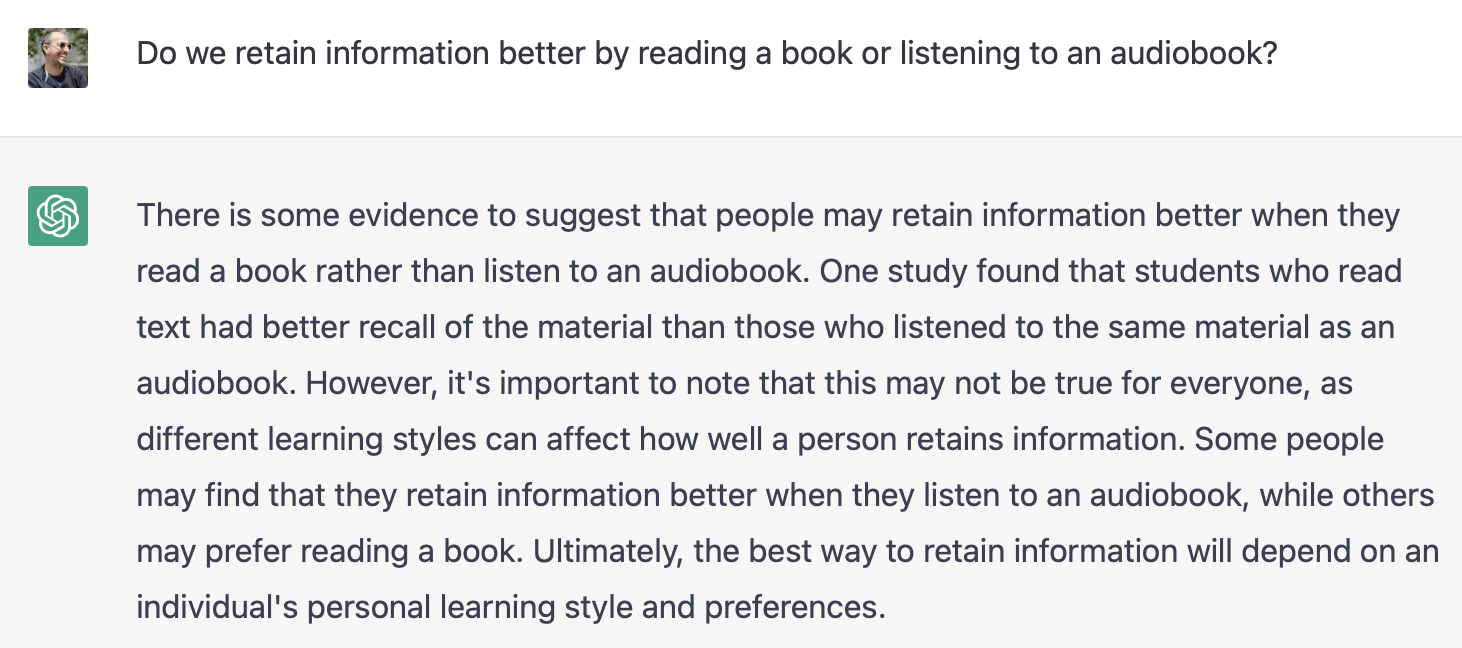
Source: Benedict Evans Newsletter No. 472
My preferred order for reading books is audio > ebook > paperback > hardback.
(Except for art and photography books, in which the order is hardback > ebook > paperback.)
Reading an audiobook of course means listening to it and debates abound whether we retain information better or worse if one reads a text or listens to it being read (examples here and here).

But, as ChatGPT says, learning styles vary and, like with many things, practice and repetition build optimal habits to get the most out of an experience.
In 2022 I read 45 audiobooks (full list at the bottom of this post).
The number of books isn’t the thing to anchor on here – listening to articles vs reading them will have a similar effect – rather the habit I’ve found most effective to both parse and retain information is reading several books on the same topic in clusters.
This has two benefits:
- You listen to variations of the same data, research and anecdotes.
- You hear different points of view on a given topic.
Several distinct topic clusters emerge in the list of books:
- Financial speculation and the irrational behavior that drives it. This was a timely topic to go deep on, following the crypto and NFT collapse. Spoiler alert: it’s predictable human behavior that causes these endlessly repeated cycles of boom and bust, divorced from the underlying asset class, which in many cases (see: Beanie Babies, NFTs) have no intrinsic value.
- Inclusive product design. An important and under invested in area.
- Product management and design at Apple. For a company that has a reputation for secrecy there’s more information available on this topic about Apple than pretty much any other company.
- Financial (mis)adventures of ultra high net worth individuals and the structures that enable them. An evergreen topic.
- Frameworks for thinking. Mental models on how to approach problem solving.
The main way I find subsequent books is via references in a current book. In most cases it leads to books that go deeper into a topic, like branching roots, but sometimes it takes you to whole new tree.
This was the case with Strangers to Ourselves, by Rachel Aviv, which was referred to by Tom Vanderbilt in You May Also Like. It’s not a book I would’ve otherwise found my way to but I’m very glad Tom led me to it as it’s a powerful and moving book.
Looking at this list, another thing that stands out is that there’s only one novel (Red Pill by Hari Kunzru, which is excellent).
Novels are almost never read by their authors. Red Pill is and it’s all the better for it. Voiceover actors tend to act out novels, altering their voices for different characters and I find it very distracting. Hari doesn’t do this (or at least I don’t remember him doing it).
While not all non-fiction books are read by their authors, there’s a greater prevalence and the voiceover actors who read non-fiction books either don’t act them out or when they do, do so subtly.
This is one thing that makes Apple’s announcement about AI audiobooks interesting. Will these AI readers act? If so, will it be subtle? What models were used to train the voices? How do they handle non-Western/Anglo-Saxon names and words? Can an author train an AI to read their books so that it sounds like them?
I’m intrigued to try audiobooks read by AI readers and also think this is bridges a valuable gap by potentially creating audiobooks of the many books that previous didn’t have audio editions, which is a very welcome development.
Full list of books in reverse chronological order (links go to Apple Books or Audibooks.com):
- Strangers to Ourselves by Rachel Aviv
- You May Also Like by Tom Vanderbilt
- A Short History of Financial Euphoria by J.K. Galbraith
- Money Mania by Bob Swarup
- Irrational Exuberance by Robert J. Shiller
- The Great Beanie Baby Bubble by Zac Bissonnette
- Amusing Ourselves to Death by Neil Postman
- Move Fast and Break Things by Jonathan Taplin
- Cinema Speculation by Quentin Tarantino
- When Women Lead by Julia Boorstin
- Like, Comment, Subscribe by Mark Bergen
- Status and Culture by W. David Marx
- The Laws of Simplicity by John Maeda
- Weapons of Math Destruction by Cathy O’Neil
- Dark Horse by Todd Rose & Ogi Ogas
- Technically Wrong by Sara Wachter-Boettcher
- Mismatch by Kat Holmes
- Imaginable by Jane McGonigal
- How Design Makes the World by Scott Berkun
- The Paradox of Choice by Barry Schwartz
- The New Breed by Kate Darling
- Predictably Irrational by Dan Ariely
- Loved by Martina Lauchengco
- Change by Design by Tim Brown
- Sprint by Jake Knapp, John Zeratsky & Braden Kowitz
- User Story Mapping by Jeff Patton & Peter Economy
- Start with Why by Simon Sinek
- After Steve by Tripp Mickle
- Inspired by Marty Cagan
- Insanely Simple by Ken Segall
- Creative Selection by Ken Kocienda
- Red Pill by Hari Kunzru
- Build by Tony Fadell
- Lucifer’s Banker Uncensored by Bradley C. Birkenfeld
- Butler to the World by Oliver Bullough
- Moneyland by Oliver Bullough
- Don’t Believe a Word by David Shariatmadari
- Reality+ by David J. Chalmers
- Thinking in Bets by Annie Duke
- Thinking in Systems by Donella Meadows
- The Scout Mindset by Julia Galef
- How to Turn Down a Billion Dollars by Billy Gallagher
- Four Thousand Weeks by Oliver Burkeman
- The Precipice by Toby Ord
- The Alignment Problem by Brian Christian
__________________
Narain
Narain